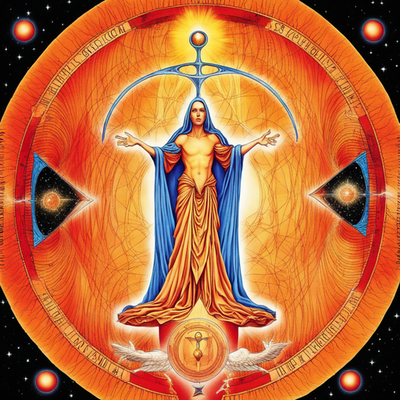Omens of Millennium and Joy Harjo the poet
A Gnostic and Spiritual Journey Through Time and Imagination by Harold Bloom and Poet Joy Harjo



Harold Bloom, a literary critic renowned for his works on Shakespeare and the Western Canon, took a different route with his book "Omens of Millennium." Delving deep into spirituality, the text transcends conventional literary criticism to become what Bloom himself calls a "Gnostic sermon." What sets it apart is its notably inner-directed approach to spirituality; an approach deeply rooted in creativity and imagination .
To understand "Omens of Millennium," it's crucial to have a grasp of Gnosticism—a religious and philosophical movement originating in the early Christian era but with roots that stretch back even further. Gnosticism focuses on personal spiritual knowledge ('gnosis') as opposed to orthodox teachings. It places a strong emphasis on inwardness and the esoteric, often tapping into ancient scriptures for wisdom.
In describing his book as a "Gnostic sermon," Bloom aligns himself with a tradition of spiritual inwardness. The text explores the significance of omens, dreams, and prophetic visions, delving into their historical contexts but also how they might be personally meaningful. It pulls from myriad sources, from Sufi mysticism to Kabbalistic teachings, all the while asking the reader to turn inward and consider these topics' relevance to their spiritual life. In this way, Bloom follows in the Gnostic tradition of valuing personal insight over doctrinal dictums.
Another distinguishing feature of "Omens of Millennium" is its commitment to creativity and imagination. While it is not uncommon for spiritual texts to encourage reflection and deep thought, Bloom's work particularly champions the role of imaginative contemplation. This is especially apparent in how he interprets various spiritual phenomena—not as strict dogma, but as metaphors open to creative interpretation.
For instance, the topic of angels is not confined to theological debate but is expanded upon as a product of human imagination, a phenomenon through which we can explore facets of our consciousness. Similarly, Bloom's discussion on prophecy goes beyond literal future-predicting to an inquiry into the very nature of time and reality.
Bloom's exploration is notably inner-directed, a quality that aligns with the Gnostic emphasis on inner experience over external ritual or dogma. The "sermon" encourages readers not just to understand but to experience spirituality, thereby making the text not just an intellectual exercise but a journey of the soul.
"Omens of Millennium" stands as an unusual but compelling work in Harold Bloom's literary portfolio. It is an enriching text that defies categorization, offering a blend of scholarly analysis and personal reflection. Through its Gnostic lens, the book creates a space where spirituality is not a realm separated from daily life but deeply intertwined with our innermost thoughts, dreams, and imaginative power.
In this era where spirituality often becomes an external spectacle or a set of moral rules, Bloom's inner-directed approach provides a refreshing and deeply meaningful alternative, echoing traditions that reach all the way back to the ancient world
LIFE AND LITERATURE!
--
Between Earth and Spirit: Joy Harjo’s Poetic Vision
Joy Harjo, the first Native American Poet Laureate of the United States, has made a profound impact on contemporary poetry through her work, which is deeply rooted in her Muscogee (Creek) heritage, spirituality, and the complexities of American identity. Born in Tulsa, Oklahoma, in 1951, Harjo has used her voice to bridge the gap between Native American traditions and the broader American experience, offering readers a rich tapestry of stories, myths, and reflections that span generations and landscapes. Her poetry is a celebration of resilience, a meditation on history and memory, and a call for healing and connection. Through her numerous collections, including She Had Some Horses, An American Sunrise, and Conflict Resolution for Holy Beings, Harjo has become a powerful figure in the world of poetry, using language to explore themes of identity, loss, and the sacredness of the natural world.
Joy Harjo's poetry is deeply informed by her identity as a member of the Muscogee (Creek) Nation, and much of her work draws on the stories, language, and worldview of her Native heritage. She has spoken about how the oral traditions of her culture, which place a strong emphasis on storytelling, have influenced her approach to poetry. For Harjo, poetry is a way of honoring her ancestors and the rich history of her people, while also exploring the challenges and complexities of being Native in contemporary America.
In her work, Harjo often weaves together traditional Native stories with personal and communal histories, creating a space where the past and present coexist. Her poetry serves as a form of cultural preservation, allowing readers to engage with the spiritual and cultural traditions of the Muscogee people. This blending of tradition with contemporary themes is central to Harjo’s voice, as she navigates the legacy of colonialism, displacement, and the struggle for cultural survival.
Spirituality is a central theme in Harjo’s poetry, which often blurs the boundaries between the physical and the spiritual worlds. Her work is imbued with a sense of the sacred, drawing on Native American cosmology, animistic beliefs, and a reverence for the natural world. For Harjo, the earth is alive with spiritual presence, and she sees poetry as a way to communicate with these energies and to seek balance and harmony.
Joy Harjo’s poetry is a bridge between the past and the present, between the material and the spiritual, and between the personal and the collective. Her work resonates with a profound sense of history and a deep awareness of the natural world, creating a space where readers can reflect on the connections that bind us all. Through her words, Harjo honors the strength and beauty of her people, while inviting readers of all backgrounds to join her in a journey of remembrance, healing, and renewal. As a poet, musician, and storyteller, Joy Harjo continues to remind us that the stories we carry have the power to shape our world and to guide us toward a deeper understanding of ourselves and each other.
--
POETRY BY JOY HARJO:
Kom ihåg himlen som du föddes under,
känn till var och en av stjärnornas berättelser.
Kom ihåg månen, vet vem hon är.
Kom ihåg solens födelse i gryningen, den starkaste tidpunkten.
Kom ihåg alla människorna som var där när du föddes:
din mor, din far, dina mostrar, dina farmödrar,
alla dina släktingar.
Vi höll på att tappa andan, medan vi sprang för att möta oss själva.
Vi bröt igenom kanten av våra förfäders strider, och var redo att slå till.
Det var svårt att förlora dagar på den indianska baren om du var hetero.
Lätt om du spelade biljard och drack för att minnas att glömma.
Vi gjorde planer på att bli professionella—och det gjorde vi.
Och några av oss kunde sjunga, så vi trummade upp en eldupplyst väg till de
stjärnbeströdda stjärnorna.
Synden uppfanns av de kristna, likaså djävulen, sjöng vi.
Vi var hedningarna, men behövde räddas
från dem—liten chans.
För att be öppnar du hela ditt väsen
mot himlen, mot jorden, mot solen, mot månen
mot en enda hel röst som är du.
Och vet att det finns mer
som du inte kan se, inte kan höra;
inte kan veta förutom i ögonblick
som stadigt växer, och på språk
som inte alltid är ljud utan andra
cirklar av rörelse.
Som örnen den söndagsmorgonen
över Salt River. Kretsade i den blå himlen
i vinden, svepte våra hjärtan rena
med heliga vingar.
Jag sprang med hjorten—
Det var en solig dag—våra ansikten glittrade av svett.
Jag kunde höra mitt hjärtas trumma slå, en livets flod som dansade.
Jag var ung och stolt,
men sprang genom min egen själ,
och skräcken och kaoset i vår historia.
LIFE AND LITERATURE!
To understand "Omens of Millennium," it's crucial to have a grasp of Gnosticism—a religious and philosophical movement originating in the early Christian era but with roots that stretch back even further. Gnosticism focuses on personal spiritual knowledge ('gnosis') as opposed to orthodox teachings. It places a strong emphasis on inwardness and the esoteric, often tapping into ancient scriptures for wisdom.
In describing his book as a "Gnostic sermon," Bloom aligns himself with a tradition of spiritual inwardness. The text explores the significance of omens, dreams, and prophetic visions, delving into their historical contexts but also how they might be personally meaningful. It pulls from myriad sources, from Sufi mysticism to Kabbalistic teachings, all the while asking the reader to turn inward and consider these topics' relevance to their spiritual life. In this way, Bloom follows in the Gnostic tradition of valuing personal insight over doctrinal dictums.
Another distinguishing feature of "Omens of Millennium" is its commitment to creativity and imagination. While it is not uncommon for spiritual texts to encourage reflection and deep thought, Bloom's work particularly champions the role of imaginative contemplation. This is especially apparent in how he interprets various spiritual phenomena—not as strict dogma, but as metaphors open to creative interpretation.
For instance, the topic of angels is not confined to theological debate but is expanded upon as a product of human imagination, a phenomenon through which we can explore facets of our consciousness. Similarly, Bloom's discussion on prophecy goes beyond literal future-predicting to an inquiry into the very nature of time and reality.
Bloom's exploration is notably inner-directed, a quality that aligns with the Gnostic emphasis on inner experience over external ritual or dogma. The "sermon" encourages readers not just to understand but to experience spirituality, thereby making the text not just an intellectual exercise but a journey of the soul.
"Omens of Millennium" stands as an unusual but compelling work in Harold Bloom's literary portfolio. It is an enriching text that defies categorization, offering a blend of scholarly analysis and personal reflection. Through its Gnostic lens, the book creates a space where spirituality is not a realm separated from daily life but deeply intertwined with our innermost thoughts, dreams, and imaginative power.
In this era where spirituality often becomes an external spectacle or a set of moral rules, Bloom's inner-directed approach provides a refreshing and deeply meaningful alternative, echoing traditions that reach all the way back to the ancient world
LIFE AND LITERATURE!
--
Between Earth and Spirit: Joy Harjo’s Poetic Vision
Joy Harjo, the first Native American Poet Laureate of the United States, has made a profound impact on contemporary poetry through her work, which is deeply rooted in her Muscogee (Creek) heritage, spirituality, and the complexities of American identity. Born in Tulsa, Oklahoma, in 1951, Harjo has used her voice to bridge the gap between Native American traditions and the broader American experience, offering readers a rich tapestry of stories, myths, and reflections that span generations and landscapes. Her poetry is a celebration of resilience, a meditation on history and memory, and a call for healing and connection. Through her numerous collections, including She Had Some Horses, An American Sunrise, and Conflict Resolution for Holy Beings, Harjo has become a powerful figure in the world of poetry, using language to explore themes of identity, loss, and the sacredness of the natural world.
Joy Harjo's poetry is deeply informed by her identity as a member of the Muscogee (Creek) Nation, and much of her work draws on the stories, language, and worldview of her Native heritage. She has spoken about how the oral traditions of her culture, which place a strong emphasis on storytelling, have influenced her approach to poetry. For Harjo, poetry is a way of honoring her ancestors and the rich history of her people, while also exploring the challenges and complexities of being Native in contemporary America.
In her work, Harjo often weaves together traditional Native stories with personal and communal histories, creating a space where the past and present coexist. Her poetry serves as a form of cultural preservation, allowing readers to engage with the spiritual and cultural traditions of the Muscogee people. This blending of tradition with contemporary themes is central to Harjo’s voice, as she navigates the legacy of colonialism, displacement, and the struggle for cultural survival.
Spirituality is a central theme in Harjo’s poetry, which often blurs the boundaries between the physical and the spiritual worlds. Her work is imbued with a sense of the sacred, drawing on Native American cosmology, animistic beliefs, and a reverence for the natural world. For Harjo, the earth is alive with spiritual presence, and she sees poetry as a way to communicate with these energies and to seek balance and harmony.
Joy Harjo’s poetry is a bridge between the past and the present, between the material and the spiritual, and between the personal and the collective. Her work resonates with a profound sense of history and a deep awareness of the natural world, creating a space where readers can reflect on the connections that bind us all. Through her words, Harjo honors the strength and beauty of her people, while inviting readers of all backgrounds to join her in a journey of remembrance, healing, and renewal. As a poet, musician, and storyteller, Joy Harjo continues to remind us that the stories we carry have the power to shape our world and to guide us toward a deeper understanding of ourselves and each other.
--
POETRY BY JOY HARJO:
Kom ihåg himlen som du föddes under,
känn till var och en av stjärnornas berättelser.
Kom ihåg månen, vet vem hon är.
Kom ihåg solens födelse i gryningen, den starkaste tidpunkten.
Kom ihåg alla människorna som var där när du föddes:
din mor, din far, dina mostrar, dina farmödrar,
alla dina släktingar.
Vi höll på att tappa andan, medan vi sprang för att möta oss själva.
Vi bröt igenom kanten av våra förfäders strider, och var redo att slå till.
Det var svårt att förlora dagar på den indianska baren om du var hetero.
Lätt om du spelade biljard och drack för att minnas att glömma.
Vi gjorde planer på att bli professionella—och det gjorde vi.
Och några av oss kunde sjunga, så vi trummade upp en eldupplyst väg till de
stjärnbeströdda stjärnorna.
Synden uppfanns av de kristna, likaså djävulen, sjöng vi.
Vi var hedningarna, men behövde räddas
från dem—liten chans.
För att be öppnar du hela ditt väsen
mot himlen, mot jorden, mot solen, mot månen
mot en enda hel röst som är du.
Och vet att det finns mer
som du inte kan se, inte kan höra;
inte kan veta förutom i ögonblick
som stadigt växer, och på språk
som inte alltid är ljud utan andra
cirklar av rörelse.
Som örnen den söndagsmorgonen
över Salt River. Kretsade i den blå himlen
i vinden, svepte våra hjärtan rena
med heliga vingar.
Jag sprang med hjorten—
Det var en solig dag—våra ansikten glittrade av svett.
Jag kunde höra mitt hjärtas trumma slå, en livets flod som dansade.
Jag var ung och stolt,
men sprang genom min egen själ,
och skräcken och kaoset i vår historia.
LIFE AND LITERATURE!